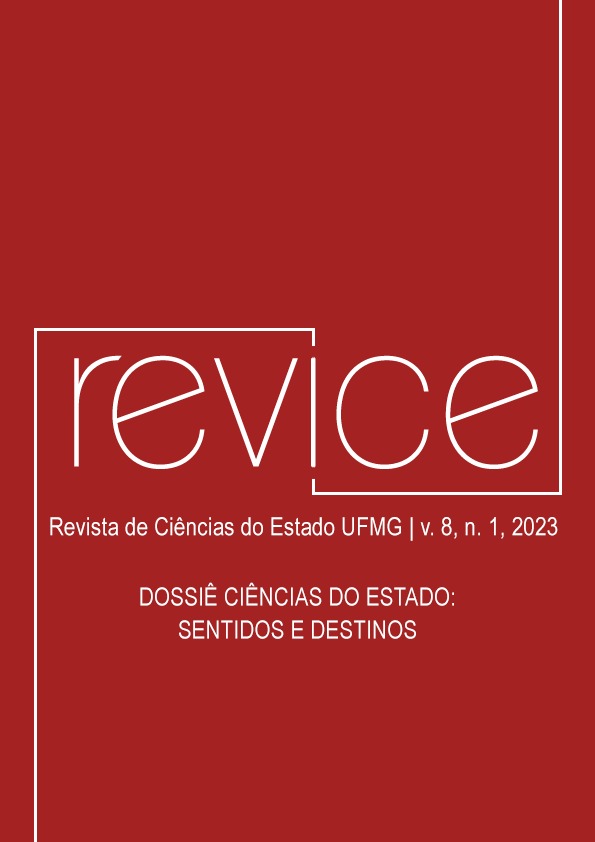The fiction of “power for power's sake”
problematizations about the purpose of the State in Aristotle's practical philosophy
DOI:
https://doi.org/10.35699/2525-8036.2023.45928Keywords:
Aristotle, Ethics, Politics, Common goodAbstract
This essay aims to i) argue for the relevance of moral values in determining political actions; ii) to present an overview of the forms of political power in antiquity and modernity, highlighting, through the parallel between the historical experiences of the polis and the nation-states, their due similarities and differences; iii) explore some critical points of Aristotle's practical philosophy regarding the concept of “common good” as a natural purpose of the community and its identification with the human purpose, happiness; iv) outline a defense of the need for the common good as a normative value that supports the construction of a conception of political science that is powerful in our time in view of its effective possibilities. In this journey, we seek to reflect on some questions in the light of Aristotelian thought in order to evaluate the place of the meaning of political life, that is, the “common good” - essentially linked, in his theory, to justice, the promotion of virtue and the condition of freedom -, as a concept that mobilizes problems for political science in our time.
Downloads
References
AMBLER, Wayne. Aristotle and Thrasymachus on the Common Good. In: BARTLETT & COLLINS (org.) Action and Contemplation: studies in the moral and political thought of Aristotle. New York: State University of New York, 1999.
ARISTÓTELES. Ética Nicomaquéia [EN]. Trad. María Araujo y Julián Marías. 8ª ed. Madrid: Centro de Estudios Políticos y Constitucionales, 2002.
ARISTÓTELES. Eudemian Ethics [EE]. Trad. Anthony Kenny. Oxford: Oxford University Press, 2011.
ARISTÓTELES. Política [Pol]. Trad. Amaral e Gomes. Lisboa: Edição Vega, 1998.
BERLIN, Isaiah. Four Essays on Liberty. Oxford: Oxford University Press, 1969.
BERTI, Enrico. Aristóteles no século XX. Trad. Dion Davi Macedo. São Paulo: Editora Loyola, 1997.
BODÉÜS, Richard. Aristóteles: A justiça e a cidade. São Paulo: Edições Loyola, 2007.
CARTLEDGE, Paul. Democracy: A life. Oxford: Oxford University Press, 2016.
COOPER, John. A Comunidade Política e o Bem Supremo. In: ZINGANO, Marco (org.). Sobre a Ética Nicomaqueia de Aristóteles. São Paulo: Editora Odysseus, 2010.
CONSTANT, Benjamin. Da liberdade dos antigos comparada à dos modernos. Filosofia Política, Porto Alegre, n. 2, 1985.
DUKE, George. The Distinctive in Common Good. The Review of Politics, University of Notre Dame, 78, 2016.
FRANK, Jill. A democracy of distinction: Aristotle and the work of Politics. Chicago: The University of Chicago Press, 2005.
HANSEN, Mogens. Democratic freedom and the concept of freedom in Plato and Aristotle. Greek, Roman, and Byzantine Studies, 50, 2010.
HERÓDOTO. História. Brasília: Ed. da Universidade de Brasília, 1985.
KEYT, David. Aristotelian Freedom. In: SCHMIDTZ, D.; PAVEL, C. E. (Org.) The Oxford handbook of freedom. Oxford: Oxford University Press, 2016.
NUSSBAUM, Martha C. Nature, Function, and Capability: Aristotle on political distribution. In: Wider Working Papers, UNU Helsinki, 1987.
SKINNER, Quentin. As fundações do pensamento político moderno. São Paulo: Companhia das Letras, 1989.
TIERNO, Patrício. Fins e meios da democracia ateniense. Cadernos de Ética e Filosofia Política, v. 2, n. 37, 2020.
TIERNO, Patrício. Os Críticos e sua Democracia: o significado do naturalismo político de Aristóteles. Conjectura: Filos. Educ., v. 23, n. 2, Dossiê Ética e democracia, 2018.
TILLY, Charles. Coerção, Capital e Estados europeus. Trad. Geraldo Gerson de Souza. São Paulo: Editora da Universidade de São Paulo, 1996.
VERNANT, Jean Pierre. As Origens do Pensamento Grego. 2ª ed. Rio de Janeiro: Editora Difel, 2002.
WEBER, Max. Política como vocação. In: Ciência e política: duas vocações. Trad. Marco Antônio Casanova. São Paulo: Martin Claret, 2015.
WOLFF, Francis. Aristóteles e a Política. 19ª ed. São Paulo: Discurso Editorial, 1999.
Downloads
Published
How to Cite
Issue
Section
License
Copyright (c) 2023 Gustavo Ceneviva Zuccolotto

This work is licensed under a Creative Commons Attribution-NonCommercial-ShareAlike 4.0 International License.
1. Os conteúdos dos trabalhos são de exclusiva responsabilidade de seu autor.
2. É permitida a reprodução total ou parcial dos trabalhos publicados na Revista, desde que citada a fonte.
3. Ao submeterem seus trabalhos à Revista os autores certificam que os mesmos são de autoria própria e inéditos (não publicados em qualquer meio digital ou impresso).
4. Os direitos autorais dos artigos publicados na Revista são do autor, com direitos de primeira publicação reservados para este periódico.
5. Para fins de divulgação, a Revista poderá replicar os trabalhos publicados nesta revista em outros meios de comunicação como, por exemplo, redes sociais (Facebook, Academia.Edu, etc).
6. A Revista é de acesso público, portanto, os autores que submetem trabalhos concordam que os mesmos são de uso gratuito.
7. Constatando qualquer ilegalidade, fraude, ou outra atitude que coloque em dúvida a lisura da publicação, em especial a prática de plágio, o trabalho estará automaticamente rejeitado.
8. Caso o trabalho já tenha sido publicado, será imediatamente retirado da base da revista, sendo proibida sua posterior citação vinculada a ela e, no número seguinte em que ocorreu a publicação, será comunicado o cancelamento da referida publicação. Em caso de deflagração do procedimento para a retratação do trabalho, os autores serão previamente informados, sendo-lhe garantido o direito à ampla defesa.
9. Os dados pessoais fornecidos pelos autores serão utilizados exclusivamente para os serviços prestados por essa publicação, não sendo disponibilizados para outras finalidades ou a terceiros.


